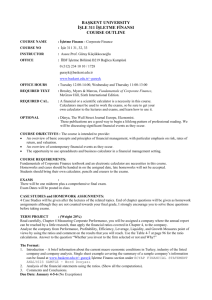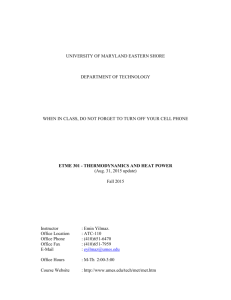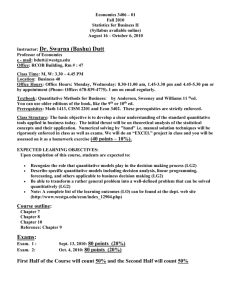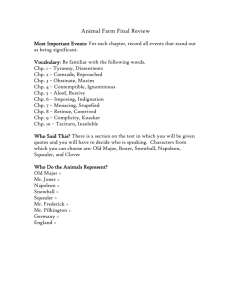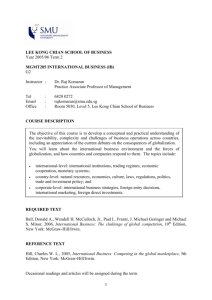UNIVERSITY OF MARYLAND EASTERN SHORE DEPARTMENT
advertisement
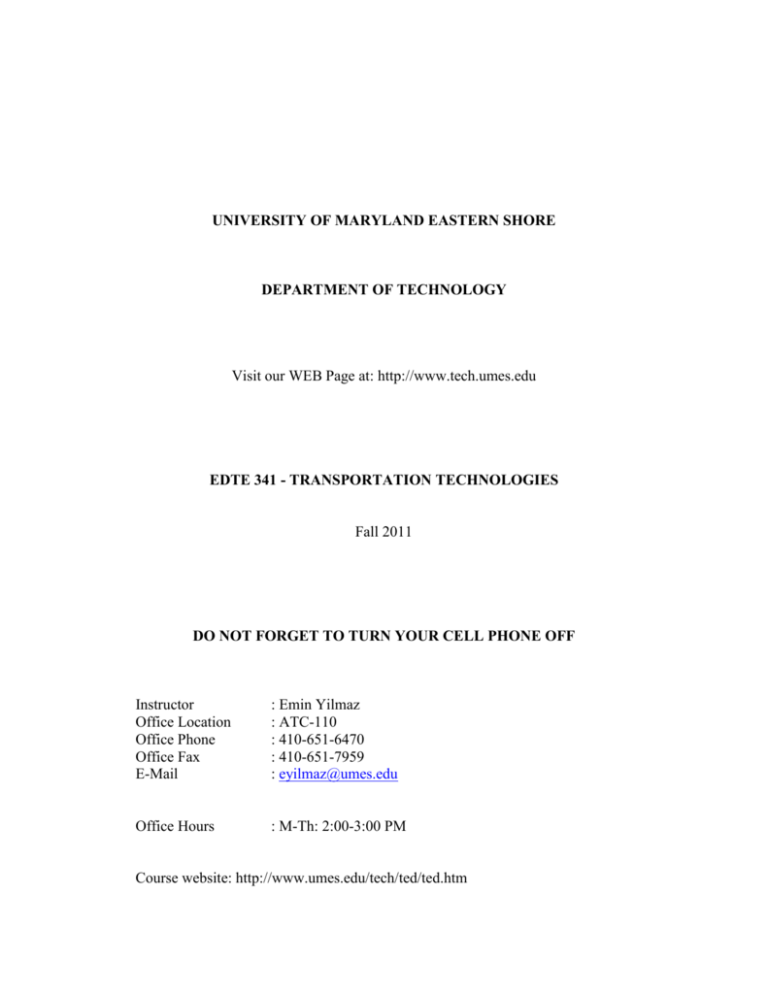
UNIVERSITY OF MARYLAND EASTERN SHORE DEPARTMENT OF TECHNOLOGY Visit our WEB Page at: http://www.tech.umes.edu EDTE 341 - TRANSPORTATION TECHNOLOGIES Fall 2011 DO NOT FORGET TO TURN YOUR CELL PHONE OFF Instructor Office Location Office Phone Office Fax E-Mail : Emin Yilmaz : ATC-110 : 410-651-6470 : 410-651-7959 : eyilmaz@umes.edu Office Hours : M-Th: 2:00-3:00 PM Course website: http://www.umes.edu/tech/ted/ted.htm A. Your Instructor: Emin Yilmaz, PhD and P.E. B.S. and M.S.: Mechanical Engineering, Middle East Technical University, Ankara-TURKEY. Doctor of Philosophy: Nuclear Engineering, University of Michigan, Ann Arbor. B. Prerequisites Junior standing, PHYS 121 and MATH 110 are required. You must see me today if you do not have any of the prerequisites. Otherwise, you will be considered to be dropped out of the course. C. Office Hours As listed on the cover page and by appointment. Please observe office hours since I shall be very busy teaching several courses and trying to do some research at the same time. D. Text Book Len S. Litowitz and Ryan A. Brown; Energy, Power and Transportation Technology. Goodheart-Wilcox Co. Inc., 2007. E. References 1. Schwaller, Anthony E., Transportation, Energy, and Power Technology. Glencoe/McGrawHill Inc., 1989. 2. Bohn, Ralph C. And Angus J. MacDonald Energy Technology: Power and Transportation, Columbus, Ohio: Glencoe, Inc. 1992. 3. Anderson, Scott (Editor) Technology, Innovation & Entrepreneurship for Students. Philadelphia, PA: Drexel University. 4. Hacker, Michael and Robert Barden Living with Technology. Albany, NY: Delmar Publishers, Inc., 1988. 5. Briggs & Stratton Service and Repair Instructions. Milwaukee, Wis.: Briggs and Stratton Corp. 6. Roth, Alfred C. Small Gas Engines, South Holland, Illinois: The Goodheart-Wilcox Company, Inc. 1992. 7. Schwaller, Anthony E. Motor Automotive Mechanics. Albany, NY: Delmar Publishers Inc., 1988. F. Course Description and Outcomes This course covers transportation systems used to transport people and goods. The design and operation of transportation systems and subsystems, governmental regulations, care of products 2 and systems, and the impact of transportation systems on society are studied. Lecture two hours, laboratory two hours. The efficient use of energy resources and the development of safe and efficient transportation systems represent two of the greatest problems facing present and future society. Transportation is defined as any technology that is used to move people and products (goods) from one place to the other. People are transported by automobiles, buses, trains, ships, aircrafts, and bicycles. Goods, such as food, merchandise, and fuels like natural gas and coal are transported in several ways including trains, trucks, ships, aircrafts, pipelines and conveyers. Energy is the full for all transportation systems. Without energy engines that power transportation systems could not function. At the completion of this course students should be able to: 1. Explain and discuss the evolution and need for transportation systems. 2. List and explain the common types of transportation systems in use today and discuss future transportation and energy needs. 3. Discuss energy resources and principles of energy conservation. 4. Explain the operational theory and applications of various types of internal combustion (heat) engines including gasoline, diesel, turbo jet, Stirling and gas turbine. 5. Discuss and explain design principles materials and parts of two and four cycle utility engines, automotive engines and marine engines. 6. Disassemble, assemble and test small utility engines. 7. Safely use and identify basic and specialized automotive tools required for engine servicing and testing applications. 8. Demonstrate appropriate safety knowledge and attitude by practicing all safety rules and precautions developed for this course. 9. Discuss the economic, social political and environmental impacts of energy and transportation systems. 3 G. Approximate Teaching Schedule Week 1 2 3 4 5 6 7 Basic Title Sections Introduction, lab safety and lab tour Energy, Power, and Transportation Technologies Chp. 1 An Introduction to Energy Chp. 2 Lab.: Basic Tools and Instruments for Engine work Small Gas Engines Chp. 14 Lab.: Tools/Diagnosis/Founders’ Convocation Catch-up and Review Exam-1 (100 min., Sept. 22) Chp. 1, 2, 14 and labs Nonrenewable Energy Sources Chp. 3 Nuclear Energy Chp. 4 Lab.: Taurus 2000 valves, cam shafts and Instrumentation Renewable and Inexhaustible Energy Sources Chp. 5 Lab.: Go-kart and Electric Generator service and start-up Catch-up and Review Exam-2 (100 min., Oct. 13) Chp. 3-5 8 Solar Energy Chp. 6 An Introduction to Power Chp. 7 Lab.: Taurus cylinder #4 misfire trouble-code Diagnosis 9 Electrical Power Systems Lab.: Transparent Engine Problem Diagnosis Chp. 8 10 Electrical Power Systems (cont.) Lab.: Small Engine Disassembly Chp. 8 11 Mechanical Power Systems Lab.: Small Engine Disassembly Chp. 9 12 Catch-up and Review Exam-3 (100 min., Nov. 17) Chp. 6-9, labs 13 Fluid Power Systems Thanksgiving Chp. 10 14 Control Technology and Automation Lab.: Small Engine Assembly/Operation Chp. 11 15 Energy and Power Conversion Devices Lab.: Small Engine Operation Chp. 13 16 Exam-4(Dec. 14, 10:00-11:50 A.M.) Make-up Exam (Dec. 15, 10:00-11:50 A.M.) Chp. 10, 12, 13 and labs All chapters and labs. Last updated on: Oct. 18, 2011 4 H. Grading 1. Weights Homework Sets/Lab. Reports (About 15) Exam-1 Exam-2 (Midterm Exam) Exam-3 Make-up Exam, if any Exam 4 (Final Exam) Safety, Neatness and Lab. Habits Laboratory Participation Attendance Attendance in Department Activities (extra) : 15 % : 15 % : 15 % : 15 % : Replaces missed exam(s) : 15 % :5% : 15 % : 5% : 5 %* * Activities are: Technology exposition, field trips, seminars, Student Society meetings, department meetings, society projects. 2. Grading Scale Since class average usually is above 70, there may not be any curving in this course. If not curved, your grade will be assigned to your overall course average as given below: 90-100: A 80-89.9: B 70-79.9: C 60-69.9: D Below 60: F I. Exams Exams shall be closed notebook and textbook. Small size blue books shall be supplied for the exams. You may be seated in the exams. Seating charts shall be available on the door of the class room before the exam if I decide to seat you. J. Make-up Exams No make-up exam shall be given unless it is absolutely necessary. You must contact me and get approval to take the make-up exam before the regular exam starts. Only one make-up exam shall be given for all missed exams on the last day of the class. Test shall cover all topics included in all previous exams and may be more difficult than regular exams. K. Home Work Homework is for you to do it at home. You must not solve homework problems together with anyone else since end result may be considered to be cheating. Due hour for the homework sets is on the due date, before class starts. Ten points out of one hundred points shall be deducted for each day of late submission. Holidays and weekends shall not be counted for lateness. No homework sets shall be accepted and graded after they are returned back to class or after five working days of the due date, whichever comes first. Homework due on the weeks of exams must be turned in on time. Exam re-do homework sets and some other homework sets will 5 be graded based on correct answers only: You will receive (a). no credit if answer is wrong, (b). full credit if answer is correct. Up to 20% may be deducted if units are not used or incorrectly used. Up to two points out of ten may be deducted if homework sets are not neatly and clearly presented. Submit your homework sets directly to me, just before the class or toss it under my door any time. Homework sets shall be returned to you in about one week's time. If you are late to a class and there is homework due, your homework is also late. Laboratory reports may be required for some of the laboratory work. Laboratory reports shall weigh as home work set. If you miss a laboratory, you can not write the report, therefore, your laboratory report grade will be zero. L. Attendance Attendance is very important in my courses since I tend to ask questions in exams on the topics I stress on. I shall take attendance from time to time (about once a week). Let me know if you have any serious reasons not to attend a class. Percentage of classes you miss will be calculated using "number of classes missed divided by the number of attendances taken". Two late-comings to a class will count as one class-day missed. You are late if you come-in to the classroom after class start time and you see me inside. M. Policy on W-Grades Due to very strong correlation between the Midterm grade and the course grade, I am recommending you to drop the course if you end up receiving an "F" as your Midterm grade and you do not have very good reason(s) for failing through the end of the midterm exam. "W" grade can only be received if you drop the course before the end of Withdrawal deadline. No grade will appear on your record if you drop the course before the end of Drop deadline. N. Policy on Incomplete Grades No incomplete grade will be passed unless there is an emergency on your part which will not let you complete the course. In order to receive an incomplete grade you must be passing the course at the time of the emergency and must have completed major portion of the course. O. Accommodating Students with Special Needs All learners have different learning styles. If you have a particular handicapping condition that I should know about, please let me know so that appropriate accommodations may be made. P. Cheating Any cheating shall be penalized severely. Severeness of penalty shall depend on how much evidence is collected for cheating. I want to make it sure that only those who take the time and do their work will receive the grade. Any student who cheats will receive, as a minimum, zero in the exam or in the homework. Depending on the severity of cheating, student may be reported to campus academic authorities for proper penalty. If cheating in any homework set or in any laboratory report is repeated, your 6 homework privileges may be suspended. In this situation weight of the homework sets shall be moved to the exams. Laboratory reports and any home assignments are considered to be homework. To avoid any possible cheating problems, you must not do homework or home assignments, or write laboratory reports with any one else. Not limited to, but, any of the following constitute cheating: 1. Giving or receiving any written information about solution of any home assignment, 2. Transcribing solution of an assignment, 3. Using solutions of home assignments which were not done by the user (like last year's homework solutions done by someone else), 4. Giving or receiving any information or materials during exams, including printed materials, pencils, calculators, erasers, etc., 5. Talking in the exams, even if it is not related with the exam, 6. Looking over someone else's exam paper during exams, 7. Using any materials that are not allowed in an exam, 8. Any other acts considered to be cheating, plagiarism or falsification by the University regulations. Some of these acts are given in the university catalog. It is your responsibility to know and understand these acts. To deter and prevent cheating during exams, open or hidden video and/or tape recorders may be used. You will not be told whether or not the exam is being recorded and/or taped. Q. Cell Phone Use Cell phone use is not allowed in class rooms. You must turn your cell phone off unless you are expecting an emergency call. You need to get my permission to leave the phone on (vibrate only). One point shall be deducted from your overall average for each disturbing call you receive. 7 STANDARDS FOR HOMEWORK, PROJECTS AND TESTS Effective communication is an important part of engineering. A correct technical result that is poorly communicated is often no better than one which is incorrect. To emphasize this fact, consideration of effective communication will be given in grading homework, projects and tests. Anything which seriously detracts from ease of understanding of your work can result in a loss of points. Illegibility will be considered as serious fault for which points will be deducted. Homework and Project Standards Your written homework and projects will be judged according to a recommended standard. Each Homework problem will be treated as a formal engineering assignment. Give table or/and figure numbers when data is taken from them. Interpolate approximately on tables unless exact interpolation is required by the problem statement. Write as clearly and as explicitly as possible, results and solutions shall not be guessed. Use only one 8.5 x 11 in size paper, and put your initials on each page. A title page should be added to each assignment. Title page should contain: (a) Course number and name, (b) Homework set no, (c) Problems submitted. (d) Due date, (e) Submission date, (f) Days late, (g) Your full name, and (h) Grade. Staple your assignment at the left hand upper corner and DO NOT FOLD IT. You may use files for the projects. A sample title page is enclosed you may copy and use it. The solution for each problem should contain: (a). Problem statement, (b). Sketch and/or diagram, (c). Analysis and results (if lengthy, summarize results in body of report, with details in appendix), (d). Discussion and conclusions when applicable. For table and figure notations follow the same form given for the figures and tables in your textbook (i.e. table number and title at top for tables, figure number and title at bottom for figures). 8 Test Standards No specific form standard can be given for tests since they may vary greatly and the student is under time pressure. For this reason it may be necessary, also, to overlook minor errors in spelling, punctuation, or grammar. It is to your own benefit, however, to communicate your knowledge to the grader as well as you can. With this in mind, you should practice effective communication techniques during tests. Occasionally points may be deducted for unnecessarily poor communication. To avoid this, you should follow the following rules: (a). Small size blue books shall be supplied (b). Put problem solutions in numerical order. Put problem numbers on every other or three pages (depending on the number of problems in the test) of your blue book. Start with the first one and go on in increasing order. Now you are ready to start answering any problem you like. Write the answers in the reserved section of your blue book for the problem you have started. (c). Bring the supplemental materials (tables, charts etc.) distributed in the class. No charts, tables, equations etc. shall be supplied during exams. (d). Always use more detailed charts and tables. Most of the time distributed charts and tables are more detailed. (e). Write your name and course name on the blue book. If there are any loose sheets, put your names on each of them, (f). Write clearly and legibly, no guessing is allowed when grading the exams, (g). State important assumptions clearly, (h). Flag important results by underlining or boxing (i). If the solutions should be excluded from grading, cross it out clearly and completely, (j). Give only one solution. Otherwise, first solution shall be accepted as the answer to the question. (k). Use the closest entry on the tables, do not interpolate unless it asked to interpolate, (l). Be as accurate as possible when reading charts. 9 EDTE 341 - TRANSPORTATION TECHNOLOGIES COVER PAGE FOR HOMEWORK SETS HOMEWORK NO : PROBLEM NO'S : CHAPTER NO : DUE DATE : SUBMISSION DATE : SUBMISSION HOUR : DAYS LATE : LAST 7-DAYS’ STUDY TIME: NAME : GRADE RECEIVED : 10 EDTE 341 - TRANSPORTATION TECHNOLOGIES HOMEWORK SETS/LABORATORY REPORTS Unless otherwise replaced, modified or due dates are changed, the following are the homework sets. Due hour is just before class starts. YOU MAY STUDY TOGETHER, BUT, SOLVING HOMEWORK PROBLEMS TOGETHER IS NOT ALLOWED. Same rules apply to laboratory reports. Sets assigned for the exam weeks must be turned in on time. Set No Due Week Chp. Problems from Textbook and/or other assignments 1 2 1 Answer “Test Your Knowledge” even problems. 2 3 2 Answer “Test Your Knowledge” even problems. Activities: #5 (at least three of them in each category). 3 4 14 Answer “Test Your Knowledge” even problems. Extra-1 5 Solve Exam-1 problems 4 6 3, 4 Answer “Test Your Knowledge”, every other even problem in each chapter. 5 7 5 Answer “Test Your Knowledge” even problems. Extra-2 8 Solve Exam-2 problems 6 9 6, 7 Answer “Test Your Knowledge”, every other even problem in each chapter. 7 10 8 Answer “Test Your Knowledge”, problems 1-20. 8 11 8 Answer “Test Your Knowledge”, problems 21-40. 9 12 9 Answer “Test Your Knowledge”, every odd problem. Extra-3 13 Solve Exam-3 problems 10 14 10 Answer “Test Your Knowledge”, every even problem. 11 15 11 Answer “Test Your Knowledge”, every even problem. Extra-4 16 13 Answer “Test Your Knowledge”, every even problem. Last updated on: Nov. 2, 2011. 11 EDTE 341 - TRANSPORTATION TECHNOLOGIES LABORATORY SAFETY INSTRUCTIONS I. GENERAL RULES The operation of the equipment in Laboratory needs special training. You shall be allowed to operate most of the equipment only with your instructor's supervision. 1. DO NOT TRY TO OPERATE ANY EQUIPMENT, 2. DO NOT FLIP SWITCHES, 3. DO NOT TURN KNOBS, 4. DO NOT OPEN OR CLOSE VALVES, 5. DO NOT PLUG OR UNPLUG CORDS, 6. DO NOT INSERT ANYTHING INTO ELECTRICAL OUTLETS, 7. DO NOT MOVE ANYTHING, ETC. WITHOUT PERMISSION OF YOUR INSTRUCTOR. 8. STAY AWAY FROM HOT SURFACES, 9. STAY AWAY FROM LIVE CONNECTIONS AND WIRES, 10. FOLLOW OPERATING INSTRUCTIONS CAREFULLY. II. EMERGENCY RESPONSE PROCEDURES Under Normal operating conditions of any engine nothing should go wrong. The events that might lead to injury are fire and explosion of the engines. Step back when an engine is in operation. Under unlikely circumstances of fire or explosion: 1. Evacuate the room without panic, 2. If anyone is on fire use: (a). Fire blanket, (b). Fire extinguisher, and 12 (c). Water hose to extinguish the fire (do not use for engine/fuel fires). 3. (i). Follow your instructor’s instructions. (ii). If he is not available due to injury etc. or for any reason and if there is an injury or fire that needs immediate attention by the professionals: (a). Call 911 using external-line telephone located in Manufacturing Laboratory (ATC 024). The telephone is located on the desk near the blackboard at the left hand side when you enter the laboratory. (b). If this phone is not available use the external-line telephones located in the Department of Technology office. These are located on the desks in the office area. The first key on my key holder (DS-146) opens the office, second key (TA1-10) opens The labs. (c). Inform the University Police by calling them at Extension: 6590 or, if no answer External line: 410-651-3300 (d). If the office keys are not available, use any emergency telephones on campus or dormitories, (e). For minor injuries (before 6:00 pm) you may walk to or call University Health Center: Ext. 6597. 4. If the unit is on fire, use fire extinguisher only. Do not use water hose unless the unit is disconnected from electric supply. Do not risk your life unless fire is very small and safe to fight. 5. Check if the fire Blanket and a Fire extinguisher is in the laboratory and Manufacturing Laboratory door is unlocked. If not, please, inform your instructor. 6. A First Aid Kit is located in the Manufacturing laboratory on one of the tables in Plastics area. 13 Name: ACTIVITIES ATTENDANCE SHEET A total of 5% Extra Credit shall be given for the following activities. Keep a record of your activities and return this form to me NO LATER THAN the day of your final exam. Do not list activities that are part of a class, part of your work, you are paid for, not part of a departmental/school/university/society activity. You must have, date, time, location and length of the activity listed. For each listed activity you must turn in a short report, the next day of the activity, to receive credit. Your attendance in the activities may be checked. If I find out that you listed an activity that you were not part of, you will receive zero as Extra Credit. Attended Activity % each % Maximum (Give the date, time, location and time-spent) -------------------------------------------------------------------------------Field Trips 10 20 Distinguished Lecturer Or Keynote Address 15 15 Seminars 8 25 Society Meetings 5 20 Society Projects 3/hr 15 Course Evaluations (all courses) 5 Other Activities 10 (extra) Total 14 100


